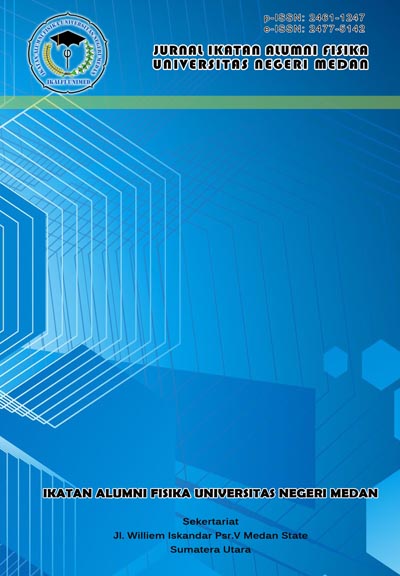PENGARUH MODEL PEMBELAJARAN KOOPERATIF TIPE GROUP INVESTIGATION TERHADAP HASIL BELAJAR SISWA PADA MATERI ELASTISITAS DAN HUKUM HOOKE
DOI:
https://doi.org/10.24114/jiaf.v4i1.10727Keywords:
, elastisistas dan hukum Hooke, group investigation, hasil belajarAbstract
Penelitian yang telah dilaksanakan bertujuan untuk mengetahui pengaruh model pembelajaran kooperatif tipe group investigation terhadap hasil belajar siswa pada materi elastisitas dan hukum Hooke. Jenis penelitian ini adalah penelitian eksperimen semu dengan desain dua kelompok pretes postes. Dua kelas diambil sebagai sampel dengan menggunakan teknik cluster random sampling, sebagai kelas eksperimen yaitu kelas XI MIA-1 dan kelas kontrol yaitu kelas XI MIA-2. Masing-masing kelas terdiri dari 27 siswa. Instrumen yang digunakan dalam penelitian adalah tes hasil belajar dan lembar observasi aktivitas siswa. Tes hasil belajar berjumlah 10 item dalam bentuk esai. Setelah diberikan perlakuan yang berbeda, diperoleh rata-rata postes kelas eksperimen = 74,63 lebih tinggi dari pada kelas kontrol = 65,15. Rata-rata nilai aktivitas siswa selama tiga kali pertemuan adalah 73,86% termasuk dalam kategori aktif. Analisis perhitungan uji t menunjukkan ada pengaruh model pembelajaran kooperatif tipe group investigation terhadap hasil belajar siswa pada materi elastisistas dan hukum Hooke di kelas XI.References
Arends, R.I., 2008, Learning to teach Belajar untuk Mengajar (Helly, P.S dan Sri Mulyantini S, Penerjemah), Pustaka Pelajar, Yogyakarta.
Arikunto, S., (2013), Manajemen Penelitian, Penerbit Rineka Cipta, Jakarta.
Shoimin, A., (2016), 68 Model Pembelajaran Inovatif dalam Kurikulum 2013, Penerbit Ar Ruzz Media, Yogyakarta.
Slavin, R.E., (2005), Cooperative Learning, penerjemah Narulita Y., Penerbit Nusa Media, Bandung.
Solichah, T.M., Trapsilo, P., & Yushardi, (2015), Implementasi Model Group Investigation (GI) Berbasis Masalah Kontekstual Dipadu Penilaian Proyek pada Pembelajaran Fisika di MA, Jurnal Pendidikan Fisika, 4(1): 26-31.
Tambunan, E., & Bukit., 2015, Analisis Pengaruh Model Pembelajaran Kooperatif Tipe Group Investigation dan Pemahaman KonsepAwal Terhadap Hasil Belajar Siswa di SMA Negeri 1 Teluk Mengkudu, 4 (1), Jurnal Pascasarjana UNIMED, Medan.
Wahyuningsih, I., Sarwi, dan Sugianto, (2012), Penerapan Model Kooperatif Group Investigation Berbasis Eksperimen Inkuiri Terbimbing untuk Meningkatkan Aktivitas Belajar, Unnes Physics Education Journal, 1(1): 1-6.
Wijayanti, F.M., Sukarmin, & Edy, W., (2015), Penerapan Model Pembelajaran Group Investigation (GI) dengan Menggunakan Media Flash Card untuk Meningkatkan Aktivitas Belajar Dan Kemampuan Kognitif Siswa, Jurnal Materi dan Pembelajaran Fisika (JMPF), 5(1): 27-34.
Wiratana, I.K., I Wayan Sadia, dan Ketut Suma., (2013), Pengaruh Model Pembelajaran Kooperatif Tipe Investigasi Kelompok (Group Investigation) Terhadap Keterampilan Proses Dan Hasil Belajar Sains Siswa SMP, e-Journal Program Pasca sarjana Universitas Pendidikan Ganesha,3(1):1-12.
Downloads
Published
Issue
Section
License
Copyright (c) 2018 JURNAL IKATAN ALUMNI FISIKA

This work is licensed under a Creative Commons Attribution 4.0 International License.
Authors who publish with this journal agree to the following terms:- Authors retain copyright and grant the journal right of first publication with the work simultaneously licensed under a Creative Commons Attribution License that allows others to share the work with an acknowledgement of the work's authorship and initial publication in this journal.
- Authors are able to enter into separate, additional contractual arrangements for the non-exclusive distribution of the journal's published version of the work (e.g., post it to an institutional repository or publish it in a book), with an acknowledgement of its initial publication in this journal.
- Authors are permitted and encouraged to post their work online (e.g., in institutional repositories or on their website) prior to and during the submission process, as it can lead to productive exchanges, as well as earlier and greater citation of published work (See The Effect of Open Access).

